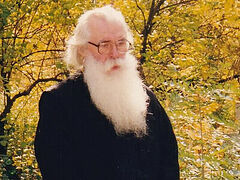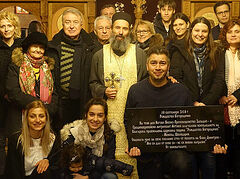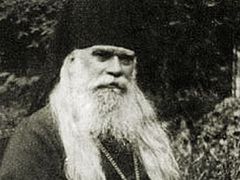In the first part of this interview, we spoke with His Eminence Metropolitan Gabriel of Lovech about his entrance into Church life, about his time serving in Russia, and about his wonderful spiritual father Vladyka Pitirim of Volokolamsk and Yurievsk. In this second part, we spoke about Metropolitan Gabriel’s service as a priest and hierarch in the Bulgarian Church, about the troubles facing the Bulgarian Orthodox people today, about work with the youth, and about the importance of maintaining fraternal relations between Orthodox peoples.
 Metropolitan Gabriel of Lovech. Photo: balkanec.bg
Metropolitan Gabriel of Lovech. Photo: balkanec.bg
—In 1991, you returned home and faced a Church schism. How did you defend the interests of the canonical Bulgarian Church?
—All the authorities at that time were siding with the schismatics: Parliament, the Cabinet, the Chief Prosecutor. Only the Lord protected us, because we could have been completely expelled and deprived of any possibility of serving and taking care of the people. There was a time when after we finished our work at the Metropolis every evening, we would take the important documents and seals with us, because the police could’ve come at any moment and simply driven us out. At any time, the Prosecutor could have authorized the closing of our churches and administrative institutions. In that difficult time, the Russian Orthodox Church helped us and supported us in everything. It was a very difficult time, but the Lord helped.
Then a different government came in and things started to improve, but it was hard for a long time. We sympathized with Ukraine, which was also facing schisms. Of course, the schism between brothers in Ukraine continues to this day, to our great regret... And we understand perfectly well what schism is. It’s very difficult; but on the other hand, in those times it was clear who was truly Orthodox, and who could be bought for money—who had purely material interests.
—And what difficulties did you face when you became a hierarch?
—I was a vicar bishop. Everything in the Sofia Diocese was done with the blessing of the Patriarch. Patriarch Maxim was a very good and wise man. He was strict, but at the same time warm and full of love. Everything we did was done with his blessing, with his permission, with his advice, so it was easier for us to make decisions. I remember complaining to Vladyka Pitirim about what difficulties and trials we had to endure during the time of the schism, but he said: “Difficult, difficult, but you don’t have it the worst. It’s most difficult for the Patriarch!” I responded: “Yes, that’s true.” Thus, everything in the Sofia Diocese was done with the grace-filled blessing of Patriarch Maxim. We visited and consecrated the churches of the Sofia Diocese and met with the flock. I served in all the churches of the diocese while I was still the protosingel.
When I became a bishop, I tried to take an example from true bishops, mainly Vladyka Pitirim, and always guided myself by his advice. I could never imitate Vladyka, but he has always been an example of a true bishop for me. Thanks to him, I have managed to do much and to avoid many mistakes that I probably would otherwise have made as a new bishop.
—Thus, what Mother Maria said about Vladyka Pitirim becoming your spiritual father came true?
—Indeed, Vladyka was my spiritual father. He came to Bulgaria often. Vladyka always supported me in difficult times. When I was still a priest, he, as if foreseeing my future episcopal ministry, gradually prepared me for it. One time he came to Bulgaria for several days. I went to see him at the hotel and said: “The Synod decided today to consecrate me.” His eyes filled with tears; he knew everything and rejoiced for me. I think Vladyka had been praying about it, because I was protosingel for a long time, at a rather difficult time for our Church.
—In 2013, you were one of three candidates for Patriarch. Could you share your experiences of that time?
—My spiritual father told me the following at that time: “A monk asks for nothing and refuses nothing.” I didn’t want to be Patriarch, but didn’t dare do anything to reject my candidacy, relying solely on the will of the Lord. And everything happened according to His holy will.
According to our charter, the Synod determines three candidates for Patriarchal elections. The candidates were Vladyka Neofit, Vladyka Galaktion, and me. When we gathered with our fellow hierarchs, I said the following: “Brothers, let’s make a promise to ourselves that none of us will work against the others.” And we kept to this: They would choose whoever they would choose. And we kept this obligation of honor before one another. I understood that if I was chosen as Patriarch, there would be a colossal change and a new era in my life. And when they chose Vladyka Neofit, I rejoiced, and I felt calm, because such was God’s will, not mine. It’s not that I refused, but it’s how the Lord determined it. Then I called my spiritual father and said: “Glory to God!” Journalists found me completely calm, because I had placed everything in the will of God.
I continued with my labors in my diocese. We managed to do quite a lot: We built a beautiful church, consecrated others, small churches, and opened a new, large school for children. Thus the Lord ordered my ministry. I must say that the Patriarch always bears a very heavy cross, and the Lord did not place such upon me, for which I thank God! We all help our Patriarch as we can.
—Vladyka, tell us about the life of the Bulgarian Church today, about the Orthodox youth.
 —The Church is living in a rather difficult time today. On the one hand, there is freedom and peace and the authorities are well-disposed towards us. On the other hand, more and more sectarian religious movements are appearing now, which carry out increasingly destructive activities. Sectarians do everything they can to win people over to them, luring them with various meetings and a “kind” attitude. Therefore, it’s very important for us to meet and speak with people as often as possible. We try to publish good literature, but the trouble is people read very little today.
—The Church is living in a rather difficult time today. On the one hand, there is freedom and peace and the authorities are well-disposed towards us. On the other hand, more and more sectarian religious movements are appearing now, which carry out increasingly destructive activities. Sectarians do everything they can to win people over to them, luring them with various meetings and a “kind” attitude. Therefore, it’s very important for us to meet and speak with people as often as possible. We try to publish good literature, but the trouble is people read very little today.
Modern man devotes most of his time to digital technology, but not to books. In our educational activities, we try to talk about the ascetics of faith and piety, about the Russian and Greek saints. In our diocese, as I said, we opened a comprehensive school where all the necessary subjects for a general education are taught, together with lessons on the Christian upbringing and moral development of the individual. We do this to help the young generation, so children would grow up in faith and purity, in culture, and mutual respect. Generally, Bulgarian schools don’t have any obligatory religious classes, but there are elective meetings with our clergy. We’re trying to spread this practice everywhere, even in kindergartens and pre-schools. Of course, COVID has disrupted many plans. In our city, priests visited kindergartens, they spoke with the children, and the parents asked for such meetings to happen as often as possible. We’ve printed very good books for children: lives of the saints in an accessible presentation for children, with very bright and beautiful illustrations.
The main focus, of course, is on educating the younger generation. We try to identify good candidates for ordination who truly have a sincere desire and heartfelt disposition to serve God in holy orders. We have many young priests who have started serving according to their calling. They genuinely care about people and they work hard, devoting their efforts and personal time.
But the forces of evil are working too, trying to direct all their potential to the fight against unity in the Orthodox world. For example, there is the Istanbul Convention. Our Church is trying to withstand these bad decisions, and our government is listening to us. Thank God, we have common views and understanding with the government. May God grant that we will have a mutual understanding with the new government, which will be formed this July. May God grant that everything will be good and peaceful. It’s very important.
—Vladyka, and how do young people, these students, relate to the Church? For example, there are quite few young people in churches in Moscow who come, sincerely believe, and respect the traditions and culture. Although, there are also many negative things that are harmful for the soul in the world of young people in Moscow. Some of the ones whom I’ve had contact with deny traditional values and the Church itself, calling it a censor and equating it with fanaticism and the tactics of prohibitions and restrictions. How are things in Bulgaria?
—It’s exactly the same in Bulgaria. I think the closer to Europe, the more noticeable such trends will be. European humanism, which opens up a huge field for choosing moral values, unfortunately does something negative, the fruits of which we see quite often. In principle, in the West, as the elders say, faith is already quite weak, even dead . And this is calamitous for the western world. We’re trying to fight it. We have the exact same situation as you described about Moscow. There are people who are drawn to the Church; there are people who are against the Church; there are people who fall in with various sects, whether Christian or non-Christian, which usually have money from the West and the opportunity to use various baits to draw people into their activities.
—What’s to be done?
—Just pray! For many people, of course, their conscience tells them where the truth is, and they’re drawn to it. But many don’t hearken to the voice of their conscience and try to live freely in all respects.
—Indeed, we can only pray, and show the beauty of Christianity by our own example. We must show our peers that a man doesn’t fade away in the Church, but develops; that the Church is where man becomes truly free and radiant.
—Our example is extremely important. A special example can be given by a spiritual father. I carefully monitor my young priests, making sure they’re responsible about their work. If a young priest is cool and passive, I would rather remove him from his duties than let him become a temptation for the faithful and those who are sympathetic towards the Church. Priests, especially young ones, must set a good example. It’s very important. A priest must always pray, because through prayer we receive grace from the Lord, which sanctifies our lives and ourselves. Of course, we are far from the ideal that the ascetics and saints show us, but still, they should be our guide and hope.
—Have there been any significant changes at the Sofia Theological School since you studied there? How does it operate today?
—The Synod has several seminaries in Bulgaria today. Of course, ecclesiasticism is preserved in this environment. There are also theological departments at secular universities. We also have a theological academy in Plovdiv. But things are a little more difficult with the theological departments. I must say that mostly Orthodox students are accepted to the theological departments of state schools, but there are also non-Orthodox students; because, according to the law, universities must take people of any confession. So things aren’t exactly as we’d like them to be there. Non-Orthodox people can become teachers too.
Of course, only baptized Orthodox people study in our theological academies, and we only have Orthodox teachers there. Our diocese has a priest who graduated from the theological department of the university, although this is a rare phenomenon. Graduates of the theological departments of universities mostly go into secular structures.
—Vladyka, let me ask you about the Russians who used to live in Bulgaria, and about the Russians who live there now.
—You’re asking about the emigration that came to Bulgaria and other European countries during the Russian revolution. All these people were very intelligent and spiritual, as I recall. They gave a lot to Europe, to the rest of the world, and to Bulgaria in particular. Among them were elders who came to Bulgaria. Schema-Igumena Maria, whom I spoke about earlier, was among the white emigrants. First she went to Serbia and founded several monasteries there. We can say that under her, female monasticism, which had nearly disappeared there at that time, was revived. Later, when she was in Bulgaria, she brought us all great spiritual benefit. Mother Maria had very many spiritual children. She was a shining example of the Christian life for us.
There were other ascetics too; for example, Vladyka Seraphim (Sobolev), who was canonized in the Russian Church a few years ago. Vladyka is venerated among the saints in the Bulgarian Church as well. Indeed, the Russian emigration gave a lot to Europe and Bulgaria. The Russians are very good people.
We have many Russians in Lovech, because many Bulgarian students studied in Russia and got married to Russian girls and then brought them here. They organize many celebrations now connected with Russian history. They always invite me and I try to go to these wonderful events when I can. Russians in Bulgaria never forget their homeland and always speak warmly about it. We have very good relations with them. I really respect the Russians, and I try to communicate with them when I have the chance. We’ve always had good relations. Politics always change, but the people don’t change their respectful attitude. Politics is politics. Today it’s one thing, tomorrow another, but I can categorically confirm that the people have good, respectful relations with Russia.
—Yes, politics is politics, and the people are always people.
—I’ll tell you this story. During one of Vladyka Pitirim’s visits to Bulgaria, we went to Shipka (a small town near the mountains). We had to stop and ask people for directions several times. Vladyka was in the passenger’s seat, and people were walking by on the sidewalk. And everyone he asked could understand and answer in Russian. They were just random passers-by who didn’t know Vladyka Pitirim. They saw that there was a Russian cleric before them, and when Vladyka asked, they all answered with such respect and love that that he exclaimed: “What good, Orthodox people!” There wasn’t a single time that people ignored Vladyka Pitirim’s question or request. And he kept repeating: “What good, Orthodox people!” Our people have always treated the Russians well. It was the same before the liberation from Turkish rule. In those difficult years of Turkish rule, the Bulgarians knew and waited for the Russians to come and liberate them. Of course, there are different people, like everywhere, but most of our peoples still have this good feeling about the Russian people. So let the Russians know: Politics is one thing, and the soul of the people is quite another.
—Vladyka, thank you very much for speaking with us. May the life of the Orthodox Bulgarian people be blessed, and may our good fraternal relations become even stronger and stronger.
—We hope so. I asked Mother Maria one time: “Who will Bulgaria be with?” She answered: “With Russia.” Look: Russia is Orthodox; Bulgaria is Orthodox: So who else would we be with? Politics is politics, but Orthodoxy is light and friendship.





